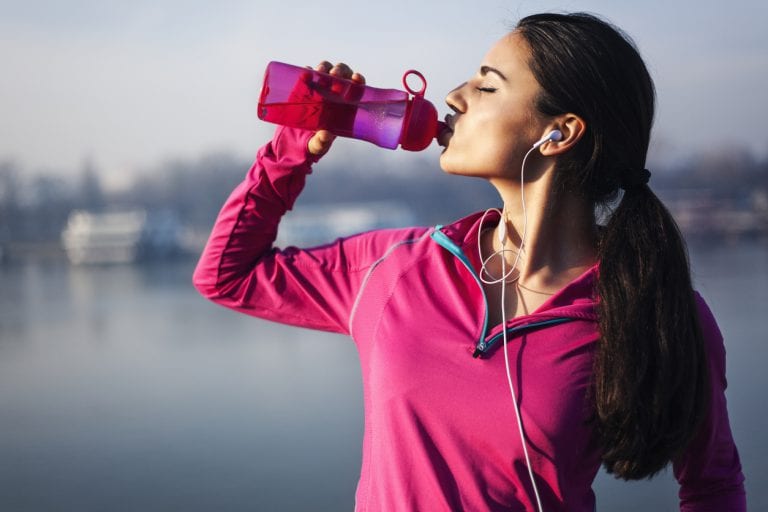Medicine or Malarkey: Can Over-Hydration Be Dangerous?
July 11, 2018

The human body is made up of up to 60 percent water, and we know that water is very important to our health! Many of us have taken this to heart by carrying reusable water bottles to work, school, and play, hydrating everywhere we go. It’s easy to think that we should drink as much water as possible to stay healthy — but in fact, there are some limits. In extreme cases, hydrating too much can have as many harmful side effects as dehydration. Discover the potential risks associated with drinking an excessive quantity of water and avoid over-hydrating.
What is Hyponatremia?
Hyponatremia is the medical term for a sodium imbalance in the body. A sodium imbalance can occur when excessive amounts of water are consumed, flooding the cells. It is sometimes also called water intoxication, overhydration, or water poisoning. Sodium, or salt, is an electrolyte that regulates how much water goes in and out of cells. Basically, too much water dilutes your sodium levels and interferes with organ function. When hyponatremia occurs, your body’s electrolytes are dangerously out of balance.
People with hyponatremia experience:
- Nausea
- Confusion
- Headache
- Drowsiness
- Muscle cramps
- Seizures
- Coma
What If You’re Too Thirsty?
Thirst is your body’s way of saying it needs water, but it can sometimes signify other health issues. If you are sitting in a very hot room or exercising, it’s normal to get thirsty. In fact, the goal should be to quench excessive thirst, especially when working out or doing something energy intensive. Thirst is a normal sign of dehydration.
But thirst can also be a symptom of another medical problem, especially if it happens often when you’re not doing anything active. Extreme thirst is most often associated with diabetes, so if you experience it, visit a healthcare professional for more information.
Both Type 1 and Type 2 Diabetes can often cause intense thirst. While intense thirst is not a good indicator alone that you have diabetes, it’s a serious symptom that shouldn’t be ignored. Diabetes causes a build up of excess glucose in your blood, and in response, the kidneys constantly try to filter it out in your urine. Because you’re dehydrated, you keep drinking more and more water in a vicious cycle. This might lead some to over-hydrate in retaliation to their excessive thirst.
Reasons People Overhydrate
Drinking too much water isn’t always connected to thirst. Some athletes, especially those in an endurance sport like long-distance running or biking, are prone to accidental over-hydration. They don’t want to get dehydrated, so they drink extra water in an attempt to prevent it. Dehydration will affect their performance, so they want to be prepared. Athletes should remember not to get carried away— they could accidentally push their water intake too far.
In other cases, dieters will drink excess amounts of water because it takes up space in the stomach. They hope that constantly filling up with water will help stave off cravings and prolong the feeling of fullness. Fasting is a popular trend in dieting, as well. Those who fast might forgo all food for a set amount of time and only drink water. These methods are never a safe way to diet.
But How Much is Too Much?
There is no set answer for how much water a person needs to drink. A good rule of thumb is to drink if you are thirsty. Athletes should only drink as much water as they can sweat out during a high-intensity activity like a marathon. If you’re an athlete, you might also consider alternating between water and the occasional sports drink to replenish electrolytes and reduce excess water intake.
Your body needs water, and hydration is incredibly important—but don’t forget that there are limits. If you feel constantly thirsty, remember that this may be a sign of underlying conditions that need medical attention. Reach out to a healthcare professional if you are concerned that your thirstiness isn’t normal. Visit a CareSpot Urgent Care Clinic today if you’re feeling unwell.
